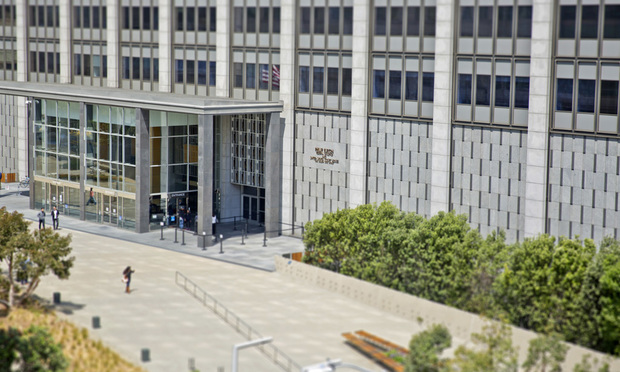DOJ Charges Chinese State Company With Conspiring to Steal DRAM Trade Secrets from Micron Company
The case marks the second high-profile trade secrets prosecution from the U.S. Attorney's office for the Northern District of California to surface this week.
November 01, 2018 at 04:49 PM
4 minute read
 450 Golden Gate, United States District Court for the Northern District of California
450 Golden Gate, United States District Court for the Northern District of California
Federal prosecutors in San Francisco have charged a Chinese state-backed company, a Taiwanese semiconductor maker and three Taiwan nationals with conspiring to steal trade secrets from a U.S. semiconductor company.
In an indictment unsealed Thursday, the DOJ lawyers claim that Taiwanese semiconductor foundry United Microelectronics Corp. (UMC) partnered with Fujian Jinhua Integrated Circuit Co. Ltd. (Jinhua), a state-owned Chinese enterprise, to steal trade secrets of dynamic random access memory, or DRAM, from Micron Technology. According to the indictment, Micron currently holds about 20 to 25 percent of the entire market share of DRAM, a widely used in technology in a variety of digital electronics that require low-cost, high-capacity memory.
The economic espionage charges against the individual defendants carry a maximum 15 year prison sentence and a $5,000,000 fine. The companies, meanwhile, could each face forfeiture penalties and a maximum fine of more than $20 billion.
“As this and other recent cases have shown, Chinese economic espionage against the United States has been increasing—and it has been increasing rapidly,” Attorney General Jeff Sessions said in a statement announcing the charges. The DOJ also filed a civil suit seeking to ban UMC and Jinua from exporting to the U.S. products created using the allegedly stolen trade secrets.
“I am here to say that enough is enough. With integrity and professionalism, the Department of Justice will aggressively prosecute such illegal activity,” Sessions said.
The announcement coincided with Sessions unveiling of a new DOJ initiative to combat Chinese economic espionage. The DRAM case marks the second high-profile trade secrets prosecution from the U.S. Attorney's office for the Northern District of California to surface this week. In an indictment unsealed Monday, the office charged four individuals with stealing trade secrets to help the company's Taiwan-based rival JHL Biosciences make biosimilar versions of Genentech drugs.
“The theft of intellectual property is not only unfair but stifles technological innovation by disincentivizing investment in long-term research and development,” said Northern District U.S. Attorney Alex Tse in a statement Thursday. “The theft of intellectual property on a continuing basis by nation-state actors is an even more damaging affront to the rule of law. We in the Northern District of California, one of the world's great centers of intellectual property development, will continue to lead the fight to protect U.S. innovation from criminal misappropriation, whether motivated by personal greed or national economic ambition.”
A spokeswoman for UMC, which has U.S. offices in Sunnyvale, California, didn't immediately respond to a request for comment.
According to the indictment, Jinhua was established in February 2016 with $5.65 billion in funding from the Chinese government and affiliated entities with the express purpose of designing, developing and making DRAM. Early that year, the DOJ claims UMC entered into a technology cooperation agreement with Jinhua to develop DRAM technology.
Key among the individual defendants is Chen Zhengkun—also known as Stephen Chen—who was general manager and chairman of an electronics corporation that Micron acquired in 2013. According to the indictment, Chen later became the president of a Micron subsidiary in Taiwan, Micron Memory Taiwan, before resigning to join EMC.
The indictment claims that Chen recruited multiple employees of Micron's Taiwanese subsidiary, including codefendants He Jianting—also known as J.T. Ho—and Wang Yungming—also known as Kenny Wang.
The indictment claims that Ho and Wang both brought Micron trade secrets related to designing and making DRAM with them to UMC. The government claims Wang downloaded over 900 proprietary Micron files before leaving the Micron unit and stored them on USB drives or in the cloud storage where he could access them after leaving for UMC.
Joel Poppen, senior vice president, legal affairs, general counsel and corporate secretary at Micron said in a statement Thursday that the company appreciated the DOJ's effort. “Micron has invested billions of dollars over decades to develop its intellectual property,” Poppen said. “The actions announced today reinforce that criminal misappropriation will be appropriately addressed.”
Read the indictment below:
Read more:
Genentech Takes Aim at Rival as Feds Charge Former Employees With Trade Secret Theft
Cybersecurity and IP Experts Warn Alleged Jet Maker Spy Plot Is a Wake-Up Call
This content has been archived. It is available through our partners, LexisNexis® and Bloomberg Law.
To view this content, please continue to their sites.
Not a Lexis Subscriber?
Subscribe Now
Not a Bloomberg Law Subscriber?
Subscribe Now
NOT FOR REPRINT
© 2025 ALM Global, LLC, All Rights Reserved. Request academic re-use from www.copyright.com. All other uses, submit a request to [email protected]. For more information visit Asset & Logo Licensing.
You Might Like
View All
Buchalter Hires Longtime Sheppard Mullin Real Estate Partner as Practice Chair

Reality TV Couple and Pacific Palisades Neighbors Sue City of Los Angeles Over Loss of Homes to Fire
3 minute read
In Resolved Lawsuit, Jim Walden Alleged 'Retaliatory' Silencing by X of His Personal Social Media Account
Trending Stories
- 1No Two Wildfires Alike: Lawyers Take Different Legal Strategies in California
- 2Poop-Themed Dog Toy OK as Parody, but Still Tarnished Jack Daniel’s Brand, Court Says
- 3Meet the New President of NY's Association of Trial Court Jurists
- 4Lawyers' Phones Are Ringing: What Should Employers Do If ICE Raids Their Business?
- 5Freshfields Hires Ex-SEC Corporate Finance Director in Silicon Valley
Who Got The Work
J. Brugh Lower of Gibbons has entered an appearance for industrial equipment supplier Devco Corporation in a pending trademark infringement lawsuit. The suit, accusing the defendant of selling knock-off Graco products, was filed Dec. 18 in New Jersey District Court by Rivkin Radler on behalf of Graco Inc. and Graco Minnesota. The case, assigned to U.S. District Judge Zahid N. Quraishi, is 3:24-cv-11294, Graco Inc. et al v. Devco Corporation.
Who Got The Work
Rebecca Maller-Stein and Kent A. Yalowitz of Arnold & Porter Kaye Scholer have entered their appearances for Hanaco Venture Capital and its executives, Lior Prosor and David Frankel, in a pending securities lawsuit. The action, filed on Dec. 24 in New York Southern District Court by Zell, Aron & Co. on behalf of Goldeneye Advisors, accuses the defendants of negligently and fraudulently managing the plaintiff's $1 million investment. The case, assigned to U.S. District Judge Vernon S. Broderick, is 1:24-cv-09918, Goldeneye Advisors, LLC v. Hanaco Venture Capital, Ltd. et al.
Who Got The Work
Attorneys from A&O Shearman has stepped in as defense counsel for Toronto-Dominion Bank and other defendants in a pending securities class action. The suit, filed Dec. 11 in New York Southern District Court by Bleichmar Fonti & Auld, accuses the defendants of concealing the bank's 'pervasive' deficiencies in regards to its compliance with the Bank Secrecy Act and the quality of its anti-money laundering controls. The case, assigned to U.S. District Judge Arun Subramanian, is 1:24-cv-09445, Gonzalez v. The Toronto-Dominion Bank et al.
Who Got The Work
Crown Castle International, a Pennsylvania company providing shared communications infrastructure, has turned to Luke D. Wolf of Gordon Rees Scully Mansukhani to fend off a pending breach-of-contract lawsuit. The court action, filed Nov. 25 in Michigan Eastern District Court by Hooper Hathaway PC on behalf of The Town Residences LLC, accuses Crown Castle of failing to transfer approximately $30,000 in utility payments from T-Mobile in breach of a roof-top lease and assignment agreement. The case, assigned to U.S. District Judge Susan K. Declercq, is 2:24-cv-13131, The Town Residences LLC v. T-Mobile US, Inc. et al.
Who Got The Work
Wilfred P. Coronato and Daniel M. Schwartz of McCarter & English have stepped in as defense counsel to Electrolux Home Products Inc. in a pending product liability lawsuit. The court action, filed Nov. 26 in New York Eastern District Court by Poulos Lopiccolo PC and Nagel Rice LLP on behalf of David Stern, alleges that the defendant's refrigerators’ drawers and shelving repeatedly break and fall apart within months after purchase. The case, assigned to U.S. District Judge Joan M. Azrack, is 2:24-cv-08204, Stern v. Electrolux Home Products, Inc.
Featured Firms
Law Offices of Gary Martin Hays & Associates, P.C.
(470) 294-1674
Law Offices of Mark E. Salomone
(857) 444-6468
Smith & Hassler
(713) 739-1250







